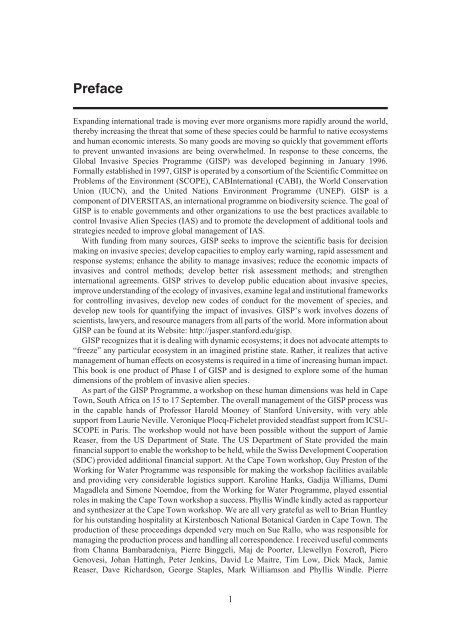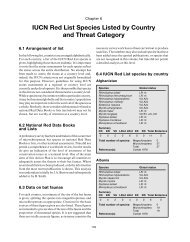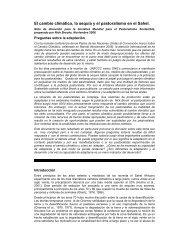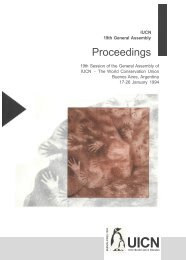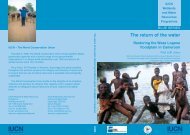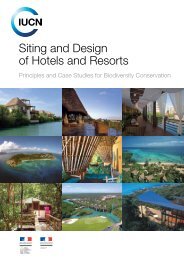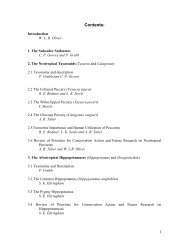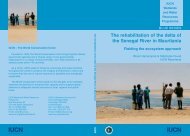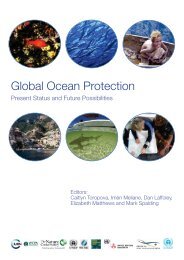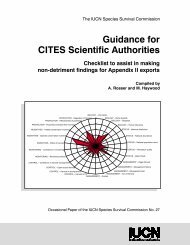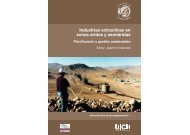Alien Species.vp - IUCN
Alien Species.vp - IUCN
Alien Species.vp - IUCN
You also want an ePaper? Increase the reach of your titles
YUMPU automatically turns print PDFs into web optimized ePapers that Google loves.
Preface<br />
Expanding international trade is moving ever more organisms more rapidly around the world,<br />
thereby increasing the threat that some of these species could be harmful to native ecosystems<br />
and human economic interests. So many goods are moving so quickly that government efforts<br />
to prevent unwanted invasions are being overwhelmed. In response to these concerns, the<br />
Global Invasive <strong>Species</strong> Programme (GISP) was developed beginning in January 1996.<br />
Formally established in 1997, GISP is operated by a consortium of the Scientific Committee on<br />
Problems of the Environment (SCOPE), CABInternational (CABI), the World Conservation<br />
Union (<strong>IUCN</strong>), and the United Nations Environment Programme (UNEP). GISP is a<br />
component of DIVERSITAS, an international programme on biodiversity science. The goal of<br />
GISP is to enable governments and other organizations to use the best practices available to<br />
control Invasive <strong>Alien</strong> <strong>Species</strong> (IAS) and to promote the development of additional tools and<br />
strategies needed to improve global management of IAS.<br />
With funding from many sources, GISP seeks to improve the scientific basis for decision<br />
making on invasive species; develop capacities to employ early warning, rapid assessment and<br />
response systems; enhance the ability to manage invasives; reduce the economic impacts of<br />
invasives and control methods; develop better risk assessment methods; and strengthen<br />
international agreements. GISP strives to develop public education about invasive species,<br />
improve understanding of the ecology of invasives, examine legal and institutional frameworks<br />
for controlling invasives, develop new codes of conduct for the movement of species, and<br />
develop new tools for quantifying the impact of invasives. GISP’s work involves dozens of<br />
scientists, lawyers, and resource managers from all parts of the world. More information about<br />
GISP can be found at its Website: http://jasper.stanford.edu/gisp.<br />
GISP recognizes that it is dealing with dynamic ecosystems; it does not advocate attempts to<br />
“freeze” any particular ecosystem in an imagined pristine state. Rather, it realizes that active<br />
management of human effects on ecosystems is required in a time of increasing human impact.<br />
This book is one product of Phase I of GISP and is designed to explore some of the human<br />
dimensions of the problem of invasive alien species.<br />
As part of the GISP Programme, a workshop on these human dimensions was held in Cape<br />
Town, South Africa on 15 to 17 September. The overall management of the GISP process was<br />
in the capable hands of Professor Harold Mooney of Stanford University, with very able<br />
support from Laurie Neville. Veronique Plocq-Fichelet provided steadfast support from ICSU-<br />
SCOPE in Paris. The workshop would not have been possible without the support of Jamie<br />
Reaser, from the US Department of State. The US Department of State provided the main<br />
financial support to enable the workshop to be held, while the Swiss Development Cooperation<br />
(SDC) provided additional financial support. At the Cape Town workshop, Guy Preston of the<br />
Working for Water Programme was responsible for making the workshop facilities available<br />
and providing very considerable logistics support. Karoline Hanks, Gadija Williams, Dumi<br />
Magadlela and Simone Noemdoe, from the Working for Water Programme, played essential<br />
roles in making the Cape Town workshop a success. Phyllis Windle kindly acted as rapporteur<br />
and synthesizer at the Cape Town workshop. We are all very grateful as well to Brian Huntley<br />
for his outstanding hospitality at Kirstenbosch National Botanical Garden in Cape Town. The<br />
production of these proceedings depended very much on Sue Rallo, who was responsible for<br />
managing the production process and handling all correspondence. I received useful comments<br />
from Channa Bambaradeniya, Pierre Binggeli, Maj de Poorter, Llewellyn Foxcroft, Piero<br />
Genovesi, Johan Hattingh, Peter Jenkins, David Le Maitre, Tim Low, Dick Mack, Jamie<br />
Reaser, Dave Richardson, George Staples, Mark Williamson and Phyllis Windle. Pierre<br />
1


